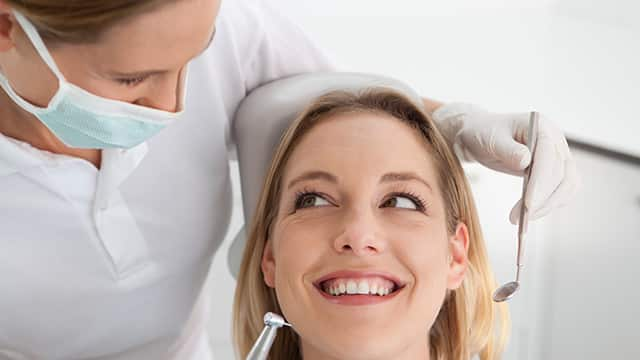But if you feel food gets stuck in your throat when you swallow more than usual, it's possibly a cause for concern. You could be experiencing dysphagia, a condition in itself, or a symptom of a larger medical condition.
If you suspect you might have dysphagia, learn the types, risk factors, and causes. Treatments can help you manage the condition, but be aware of dysphagia's symptoms, so you seek treatment as soon as you can. The everyday business of swallowing is a surprisingly complex feat, one we want you to do with ease.
How You Swallow
Amazingly, it takes 50 pairs of muscles and various nerves to swallow. To get food, drink, and medications from your mouth to your stomach is a three-step process, explains the National Institute on Deafness and Other Communication Disorders (NIDCD).
Step One: Your tongue, your jaw, and, often, your teeth work with your saliva to prepare you to swallow something.
Step Two: Your tongue scoops the item to be swallowed to the back of your mouth, activating the swallowing response. This, in turn, allows whatever you've swallowed to pass through your throat – more specifically, your pharynx.
Step Three: Your food, drink, or medicine goes down your esophagus to your stomach.
Risk Factors and Causes of Dysphagia
To easily complete the three-step swallowing process, all 50 muscles and nerves need to work as intended. The common risk factors of aging and certain health conditions can lead to a glitch in the process or dysphagia.
Aging: While dysphagia can and does happen at any age, it's often an issue with older adults. For people over age 65, up to 20 percent have dysphagia, notes research published in the journal Geriatrics. And the percentage of seniors experiencing dysphagia increases as they age, become frailer or face certain health conditions.
Certain Medical and Oral Health Conditions: At any age, people with certain disorders affecting the nerves and muscles needed for swallowing can experience dysphagia. Conditions that might cause dysphagia include:
- Neurological disorders, such as Parkinson's disease, multiple sclerosis, muscular dystrophy, cerebral palsy, strokes, dementia, and Alzheimer's disease
- Head and spinal cord injuries causing neurological disorders
- Tumors in the mouth, throat, or esophagus
- Gastroesophageal reflux disease (GERD)
- Narrow esophagus brought on by tumors or GERD
- Enlarged heart and undergoing open-heart surgery
- Cleft palate
- Untreated bad teeth, including decayed wisdom teeth
- Dentures needing repair
- Conditions brought on by smoking and alcohol use
Also, certain medicines can affect your ability to swallow, as can radiation treatment for head and neck cancers. And the Mayo Clinic points out some lesser-known dysphagia causes:
- Conditions targeting your esophagus include achalasia, diffuse spasms, eosinophilic esophagitis, and scleroderma.
- With pharyngoesophageal diverticulum (Zenker's diverticulum), a small pouch can form collecting food, typically above your esophagus.
Types and Symptoms of Dysphagia
How you'll experience dysphagia depends on the type of dysphagia you have.
Oropharyngeal Dysphagia: This occurs when you struggle to move food from your mouth to your upper esophagus. In addition to being unable to swallow, symptoms might include:
- Drooling, coughing, gagging, and choking as you swallow
- Regurgitating liquids through your nose
- Breathing saliva or food into your lungs
- Talking weakly or being hoarse
- Losing weight and dehydrating
FYI: Oropharyngeal dysphagia can lead to pneumonia.
Esophageal Dysphagia: This happens when you have a problem moving food through your esophagus into your stomach. Symptoms include:
- Pain when swallowing
- Feeling food is stuck in your throat
- Pressure or pain in your chest
- Chronic heartburn, sore throat, or belching
If you regularly experience any of these symptoms – and especially if you're at risk for dysphagia – make an appointment with your doctor or dentist.
Treatment and Management
Treatment for swallowing difficulties depends on the severity, cause, and type of dysphagia – something you should discuss with your medical professional. Basic treatments for the two types of dysphagia usually involve therapeutic, medicinal, or out-patient procedures.
Oropharyngeal Dysphagia: Your doctor might refer you to a speech therapist who'll teach you exercises to coordinate your muscles and help stimulate nerves responsible for swallowing. You might also learn head positions that make swallowing easier.
Esophageal Dysphagia: Treatments might involve stretching the esophagus with a special balloon, surgery to remove tumors, or clear the esophagus. Medications can help with problems associated with GERD. You might get a prescription for corticosteroids to treat esophagitis or relaxants to reduce esophageal spasms.
To manage any dysphagia type, you'll probably need to change the way you eat by:
- Taking smaller bites
- Chewing more thoroughly
- Eating softer food
- Pureeing food
Or you can learn behavior modification methods to reduce anxiety when swallowing.
Swallowing seems like a basic bodily function. Sometimes, though, medical issues make it difficult to do something so essential to your well-being. By being aware of dysphagia's risk factors, causes, and symptoms, you might be able to take back your ability to swallow or the ease that you can do so with treatment and care.
Oral Care Center articles are reviewed by an oral health medical professional. This information is for educational purposes only. This content is not intended to be a substitute for professional medical advice, diagnosis or treatment. Always seek the advice of your dentist, physician or other qualified healthcare provider.
ORAL HEALTH QUIZ
What's behind your smile?
Take our Oral Health assessment to get the most from your oral care routine
ORAL HEALTH QUIZ
What's behind your smile?
Take our Oral Health assessment to get the most from your oral care routine














